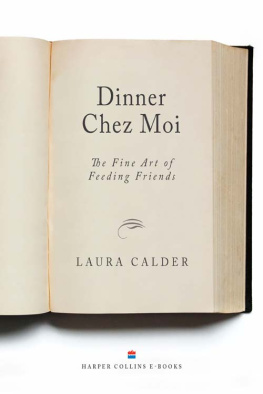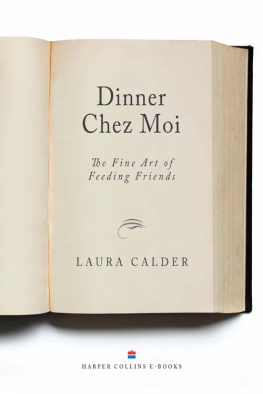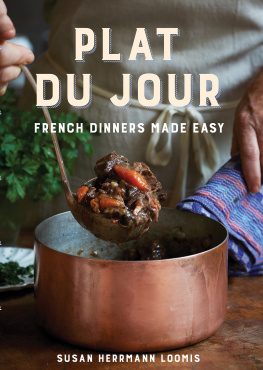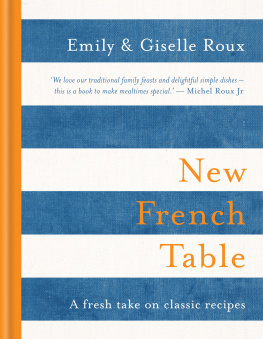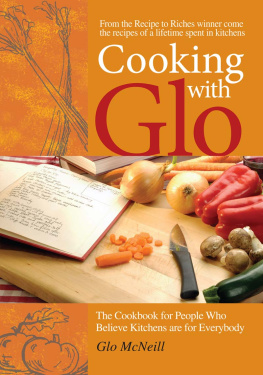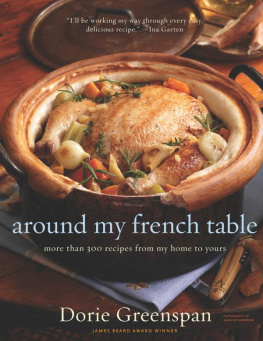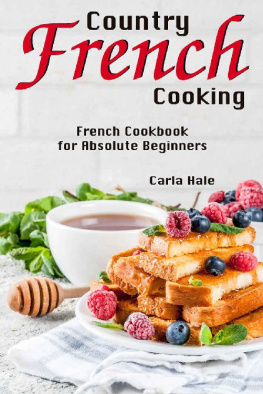FRENCH FOOD
AT HOME
Laura Calder

In memory of my great-aunt Helen Patterson Regan
and for one of the great heroes of my life,
Virginia Tufts Pickett
CONTENTS
F rench food is, above all, a state of mind: caring about the quality and fresh-ness of ingredients, delighting in the kitchen rather than dreading it, and indulging in the social and sensual life of the table. It isnt just about starred restaurants, professional culinary textbooks, and peasant traditions. My experience of French cooking has been largely in home kitchens, including my own. I have gained skills and a useful repertoire, but more than that, France has taught me to slow down, to cook and eat as though it mattered, to make it matter. And that attitude is the most important thing to take away with you. You have your own ingredients to be proud of wherever you live. French cooking can suggest ways to bring out the best in them. French eating can show you a lifestyle for savoring them more fully. That is what French Food at Home is all about.
I also wanted to show you how liberating French cuisine can be for the home cook, how there is room for personal expression, how it is accessible, and how it has evolved to suit modern tastes. My way of doing that is by giving you a picture of life in my own kitchen in France (minus the flops) through a collection of recipes that I have learned to make here. They range from easy to less so, from fast to slow, from traditional to contemporary, and they are set in the context of dinner by courses, so that you can plan a meal as basic or elaborate as you like.
T he French approach the apritif hour with an ease and simplicity well worth adopting: all the effort it has to take is opening a packet of nuts and popping a cork. Im all for this because, as the cook, it means I get to stop working and join the party, rather than transform myself into a cocktail waitress.
The drinks are simple. Usually, a bottle is opened to share: chilled ros, white, or sparkling wine. A bottle of cassis may be on offer too, in case someone wants a kir. And if there is a specialty of the region, such as pastis or Suze, that may be served as well. Im not saying there arent people out there who reach for whiskey or port (yes, port before dinner), not to mention their collection of shady, untouched bottles brought back from travels. But in the general run of things, variety is not a requirement; not, in fact, necessarily even desirable.
The same goes for the food accompanying those drinks. A bowl of pistachios or potato chips is usually it. Or there might be a dish of olives or radishes, maybe a plate of thinly sliced artisanal sausage. Those are my staples. If Im in the mood, I might make Mayonnaise and Crudits or Gougres. And, on special occasions, I can be inspired to go a bit further and present, perhaps, gratined Hot Mussels or Herb Beignets.
But involved hors doeuvre are the exception for me, not the rule. And I dont bring out tray upon tray either; I choose one thing and try to do it nicely. The point of the apritif is to take a breath and make the transition between the business of life and the relaxed enjoyment of the meal to come. You want to excite the appetite too, not extinguish it. I figure, all guests really want is a salty nibble so their heads dont spin from drinking on an empty stomach. And all the cook wants (and deserves) is a chance to sit down.
SPICED ALMONDS
[Makes 1 cap/150g]
W hatever amount of spiced nuts you make youre going to eat, so if I look cheap with my quantities, consider it an act of benevolence, not parsimony. Feel free to vary the spices depending on what you have around, and be sure to judge amounts according to your own taste, because spices vary in strength depending on their quality. As for the nuts, hazelnuts or pecans are nice alternatives. I wouldnt go mixing them, though; somehow it reminds me of those tacky mail-order bridge mixes from the 1970s.

1 cup/150 g whole almonds, with their skins on
2 teaspoons peanut or vegetable oil
1 to 2 teaspoons paprika
1 to 2 teaspoons cumin
A good pinch of chili powder
Salt and pepper
Toast the nuts in a dry frying pan over medium heat, stirring more or less constantly and keeping a hawks eye on them, because they can burn easily. These will take about 20 minutes to darken like aged oak and emit a nutty, roasted perfume.
When the almonds are quite dry, add the oil and toss the pan. Now add the spices and seasonings, tossing again to coat. Slide the almonds onto a plate, spreading them out to dry for about 5 minutes. Taste them. Adjust the seasoning. Pour into a bowl and serve, or keep in an airtight container for a few hours.
SEASONED OLIVES
[Makes 1 cap/160 g]
I t may be only a small gesture but at some level this recipe is about control. Yes, you can buy olives already seasoned. You can buy a lot of things ready-made and you know what most of them are like. Id rather decide for myself on the quality of oil, on the mix of herbs, on the balance of seasonings. And I want the freedom to flavor my olives this way one weekslick, herb-flecked, lemony, and saltyand the next week with a scattering of chile peppers, or with a few feathers of fennel or dill. Maybe I want green olives this time and black the next. Besides, I like looking at whats on the table and being able to say, I did that.

1 cup/160 g olives
cup/60 ml high-quality olive oil
4 garlic cloves, crushed
1 tablespoon lemon juice, or to taste
Grated zest of 1 lemon
2 teaspoons chopped thyme leaves
1 bay leaf
Freshly cracked black pepper
Mix all the ingredients in a bowl so that the olives are well coated, slick, and glistening with marinade. Taste and adjust the seasonings. Spill the olives into a jar and screw on the cap. Refrigerate 3 to 5 days.
Serve. And when all the olives are eaten, marinate a piece of meat in the remaining oil, or use it in salad dressing; whatever you do, dont throw it out.
THYME LICKS
T hese are for sucking, not eating, which might strike some as odd. The recipe comes from the owners of a shop in my neighborhood called Alicante, which specializes in oils from all over the world, in particular, very fine olive oils. You just pick up a tiny branch, suck off the herb-perfumed oil, and then discard the twig like a pit. Maybe give a demo so that nobody starts choking them down whole.
Next page

